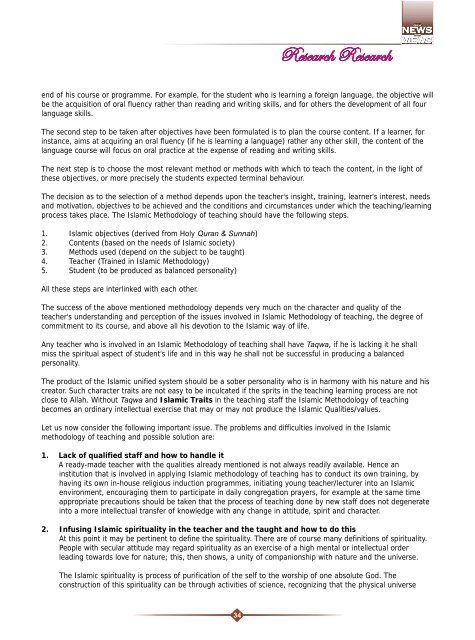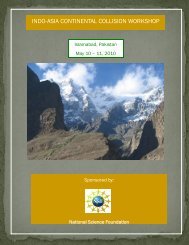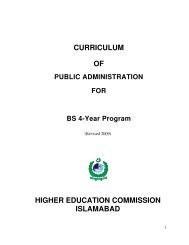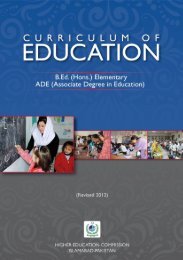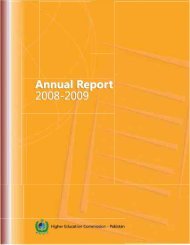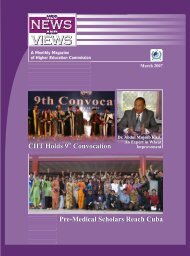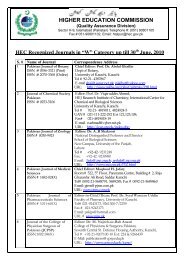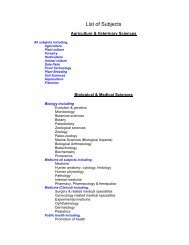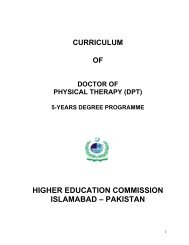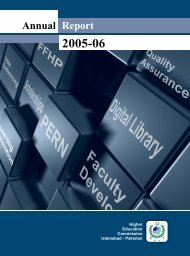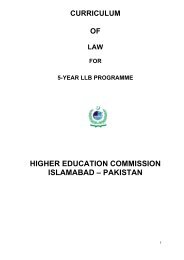Ethics Dilemmas in Qualitative Research - Higher Education ...
Ethics Dilemmas in Qualitative Research - Higher Education ...
Ethics Dilemmas in Qualitative Research - Higher Education ...
You also want an ePaper? Increase the reach of your titles
YUMPU automatically turns print PDFs into web optimized ePapers that Google loves.
end of his course or programme. For example, for the student who is learn<strong>in</strong>g a foreign language, the objective will<br />
be the acquisition of oral fluency rather than read<strong>in</strong>g and writ<strong>in</strong>g skills, and for others the development of all four<br />
language skills.<br />
The second step to be taken after objectives have been formulated is to plan the course content. If a learner, for<br />
<strong>in</strong>stance, aims at acquir<strong>in</strong>g an oral fluency (if he is learn<strong>in</strong>g a language) rather any other skill, the content of the<br />
language course will focus on oral practice at the expense of read<strong>in</strong>g and writ<strong>in</strong>g skills.<br />
The next step is to choose the most relevant method or methods with which to teach the content, <strong>in</strong> the light of<br />
these objectives, or more precisely the students expected term<strong>in</strong>al behaviour.<br />
The decision as to the selection of a method depends upon the teacher's <strong>in</strong>sight, tra<strong>in</strong><strong>in</strong>g, learner's <strong>in</strong>terest, needs<br />
and motivation, objectives to be achieved and the conditions and circumstances under which the teach<strong>in</strong>g/learn<strong>in</strong>g<br />
process takes place. The Islamic Methodology of teach<strong>in</strong>g should have the follow<strong>in</strong>g steps.<br />
1. Islamic objectives (derived from Holy Quran & Sunnah)<br />
2. Contents (based on the needs of Islamic society)<br />
3. Methods used (depend on the subject to be taught)<br />
4. Teacher (Tra<strong>in</strong>ed <strong>in</strong> Islamic Methodology)<br />
5. Student (to be produced as balanced personality)<br />
All these steps are <strong>in</strong>terl<strong>in</strong>ked with each other.<br />
The success of the above mentioned methodology depends very much on the character and quality of the<br />
teacher's understand<strong>in</strong>g and perception of the issues <strong>in</strong>volved <strong>in</strong> Islamic Methodology of teach<strong>in</strong>g, the degree of<br />
commitment to its course, and above all his devotion to the Islamic way of life.<br />
Any teacher who is <strong>in</strong>volved <strong>in</strong> an Islamic Methodology of teach<strong>in</strong>g shall have Taqwa, if he is lack<strong>in</strong>g it he shall<br />
miss the spiritual aspect of student's life and <strong>in</strong> this way he shall not be successful <strong>in</strong> produc<strong>in</strong>g a balanced<br />
personality.<br />
The product of the Islamic unified system should be a sober personality who is <strong>in</strong> harmony with his nature and his<br />
creator. Such character traits are not easy to be <strong>in</strong>culcated if the sprits <strong>in</strong> the teach<strong>in</strong>g learn<strong>in</strong>g process are not<br />
close to Allah. Without Taqwa and Islamic Traits <strong>in</strong> the teach<strong>in</strong>g staff the Islamic Methodology of teach<strong>in</strong>g<br />
becomes an ord<strong>in</strong>ary <strong>in</strong>tellectual exercise that may or may not produce the Islamic Qualities/values.<br />
Let us now consider the follow<strong>in</strong>g important issue. The problems and difficulties <strong>in</strong>volved <strong>in</strong> the Islamic<br />
methodology of teach<strong>in</strong>g and possible solution are:<br />
1. Lack of qualified staff and how to handle it<br />
A ready-made teacher with the qualities already mentioned is not always readily available. Hence an<br />
<strong>in</strong>stitution that is <strong>in</strong>volved <strong>in</strong> apply<strong>in</strong>g Islamic methodology of teach<strong>in</strong>g has to conduct its own tra<strong>in</strong><strong>in</strong>g, by<br />
hav<strong>in</strong>g its own <strong>in</strong>-house religious <strong>in</strong>duction programmes, <strong>in</strong>itiat<strong>in</strong>g young teacher/lecturer <strong>in</strong>to an Islamic<br />
environment, encourag<strong>in</strong>g them to participate <strong>in</strong> daily congregation prayers, for example at the same time<br />
appropriate precautions should be taken that the process of teach<strong>in</strong>g done by new staff does not degenerate<br />
<strong>in</strong>to a more <strong>in</strong>tellectual transfer of knowledge with any change <strong>in</strong> attitude, spirit and character.<br />
2. Infus<strong>in</strong>g Islamic spirituality <strong>in</strong> the teacher and the taught and how to do this<br />
At this po<strong>in</strong>t it may be pert<strong>in</strong>ent to def<strong>in</strong>e the spirituality. There are of course many def<strong>in</strong>itions of spirituality.<br />
People with secular attitude may regard spirituality as an exercise of a high mental or <strong>in</strong>tellectual order<br />
lead<strong>in</strong>g towards love for nature; this, then shows, a unity of companionship with nature and the universe.<br />
The Islamic spirituality is process of purification of the self to the worship of one absolute God. The<br />
construction of this spirituality can be through activities of science, recogniz<strong>in</strong>g that the physical universe<br />
34


